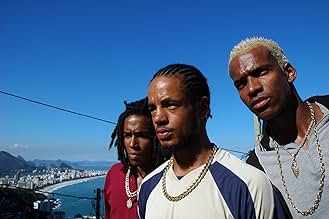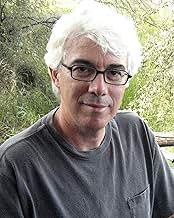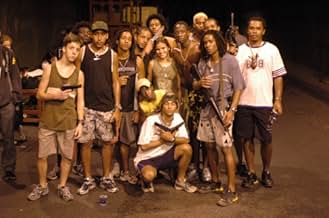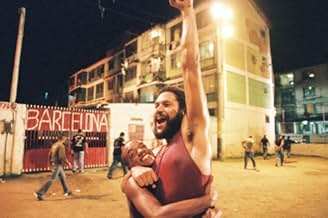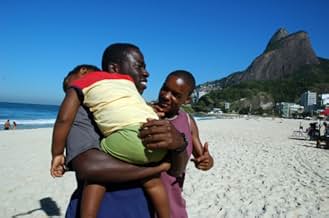Best buddies Acerola and Laranjinha, about to turn 18, discover things about their missing fathers' pasts which will shatter their solid friendship, in the middle of a war between rival drug... Read allBest buddies Acerola and Laranjinha, about to turn 18, discover things about their missing fathers' pasts which will shatter their solid friendship, in the middle of a war between rival drug gangs from Rio's favelas.Best buddies Acerola and Laranjinha, about to turn 18, discover things about their missing fathers' pasts which will shatter their solid friendship, in the middle of a war between rival drug gangs from Rio's favelas.
- Awards
- 14 nominations total
Naima Silva
- Camila
- (as Naíma Silva)
Eduardo 'BR' Piranha
- Nefasto
- (as Eduardo BR)
Featured reviews
I just saw it and despite of the rough theme is a sensitive and emotive movie, very different from City of God. City of God was frenetic, full of effects, City of Men is more traditional and the narrative is more conventional. The traffic and the violence is in the background, the theme here is the paternity. Acting is first class, music is melodious and integrate to the scenes, photograph is similar to City of God. Above the summary: Laranjinha and Acerola are preparing themselves to adult life! At the age of 18, each boy has his own problems: Child, women, family, job, forgotten wishes and dreams are some of this adventure's spices, which, to add another pinch of thrill, tells about a war on the hill that will expel the young adults from their community. Will be definite all those changes?
This sepia-sunbleached feature derives from, and features the same main characters as, the eponymous 2002-2005 Brazilian TV series about (mostly) boys in the "favela" hill ghettos above Rio for which Morelli did some of the writing and directing. The series, starring Darlan Cunha as Laranjinha (Wallace) and Douglas Silva as Acerola (Ace) --growing up from year to year and episode to episode--sort of grew out of the Fernando Meirelles/Kátia Lund film, 'City of God,' which in turn was based on Paulo Lins' tumultuous and partly autobiographical novel about three decades in the slums and the involvement of youth as dealers, assassins, and victims. Actually the Ace/Wallace characters as young teenagers, always played by Silva and Cunha, predate 'City of God' by two years; they appeared in a short film called 'Palace II' in 2000. The history of these films and stories is as intricate as the world they depict. Douglas Silva was the prepubescent tough in 'City of God' known by he moniker Dadinho--Lil' Dice.
'City of Men' is warmer and more intimate than the original film. 'City of God' has been both admired for its virtuosity--it's full of tours de force of visual violence and equally brilliant feats of rapid storytelling--and condemned as reveling too much in blood and gore, making teenage killers who terrorize neighborhoods into little glamor boys. That's quite true. It's unfortunately also true that in the ghettos of Rio as of other places such as the USA, young gun-toting drug dealers are the sexy local pop stars. Maybe the earlier film fails to take a sufficiently clear moral stand, or too much reflects the viewpoints of the young favela males it depicts. Nonetheless it's exhilarating film-making. Paradoxically, it also has a more positive arc than 'City of Men,' because its hero works his way out of the slums and into mainstream Rio de Janeiro to become a photojournalist. In 'City of Men,' nothing like that happens. Instead, there is a difficult reconciliation between the two boys, on the brink of eighteen, despite a stunning revelation about their lost fathers, and one of the fathers comes back into the picture and, reluctantly at first, chooses to be a warm presence in the life of his son. Both of the boys endure moments of terrible loneliness and isolation, which reveal how isolating the world of shifting and dangerous loyalties and hills fought for and lost is for a boy who in the first place lacks parents. But the focus is on the reconciliations.
In the TV series, the boys are in school. They face difficulties even showing up, and only one of them, Ace (Silva) really hits the books (he's also fascinated by guns of all kinds). Laranjinha is closer to turning into a young hood.
Thugh the new movie 'City of Men' is less specific than the TV series (judging by the DVD collections of episodes that I've seen) and suffers a bit by comparison with either it or 'City of God,' the vibrancy of the life on offer in all these films is still unmistakable, as well as the attractiveness of the young actors, the warmth of the world evoked--and vernacular swiftness that of the filming and editing, which somehow is both relaxing and unnerving.
Wallace/Laranjinha is trying to find out who his real father is; he doesn't want "unknown" to be on the place for "father" on his papers. Acerola knows his father is dead, and he wants to know what happened. He's faced with the local problem from the other side. His wife Cris (Camila Monteiro) keeps leaving their toddler son Clayton (Vinicius Oliveira) with him to take care of. He doesn't want to accept the responsibility. But if he reneges on it, he'll leave Clayton in the same place he and Wallace are in. Ace abandons Clayton on the beach early on when Madrugadão (Midnight, Jonathan Haagensen), the gang leader of the hill where they live, risks assassination to descend on a super-hot day for a swim in the ocean. He also turns some flashy cartwheels and shows off his spectacular pecs. Madrugadão, like Wallace (i.e. Darlan Cunha), is handsome and charismatic. Ace is so childish he forgets his own son; but he rushes back and finds him. And when Cris gets a job in the wealthier city of São Paulo, Ace, with great difficulty, forces himself to take on the responsibility of raising Clayton.
Wallace (perhaps a bit too easily) finds his father, a bearded man named Heraldo (Rodrigo dos Santos), who has just gotten out of prison after serving fifteen years of a twenty-year sentence--for murder. Heraldo's beard cannot conceal the fact that he is not very mature. He hasn't shouldered the responsibilities of being a man. But he also carries the weight of suffering and gratitude.
When rival gang leader Fasto (Eduardo "BR" Piranha) takes over Midnight's territory on Dead End Hill, a new gang war breaks out right in the middle of Ace and Wallace's journey of self-discovery.
'City of Men' is a more tender, individual and grownup story than 'City of God'; from what I've seen of the TV series it grows out of, it's less specific and less witty. It works as a kind of antidote to the amorality one feels in 'City of God,' and its warmth is touching. Nor is it visually ineffective, or its sense of the milieu less rich--except. Except that it quite lacks the momentum and adrenaline-rush brilliance of 'City of God's' virtuoso film-making and editing, or the rich range of minor characters the latter has. It is a little bit meandering, and its fast jump-cut slides from scene to scene sometimes seem out of place. As the AV Club reviewer says, much has been gained in this new film, but much has been lost as well. Still 'City of Men' is well worth watching.
'City of Men' is warmer and more intimate than the original film. 'City of God' has been both admired for its virtuosity--it's full of tours de force of visual violence and equally brilliant feats of rapid storytelling--and condemned as reveling too much in blood and gore, making teenage killers who terrorize neighborhoods into little glamor boys. That's quite true. It's unfortunately also true that in the ghettos of Rio as of other places such as the USA, young gun-toting drug dealers are the sexy local pop stars. Maybe the earlier film fails to take a sufficiently clear moral stand, or too much reflects the viewpoints of the young favela males it depicts. Nonetheless it's exhilarating film-making. Paradoxically, it also has a more positive arc than 'City of Men,' because its hero works his way out of the slums and into mainstream Rio de Janeiro to become a photojournalist. In 'City of Men,' nothing like that happens. Instead, there is a difficult reconciliation between the two boys, on the brink of eighteen, despite a stunning revelation about their lost fathers, and one of the fathers comes back into the picture and, reluctantly at first, chooses to be a warm presence in the life of his son. Both of the boys endure moments of terrible loneliness and isolation, which reveal how isolating the world of shifting and dangerous loyalties and hills fought for and lost is for a boy who in the first place lacks parents. But the focus is on the reconciliations.
In the TV series, the boys are in school. They face difficulties even showing up, and only one of them, Ace (Silva) really hits the books (he's also fascinated by guns of all kinds). Laranjinha is closer to turning into a young hood.
Thugh the new movie 'City of Men' is less specific than the TV series (judging by the DVD collections of episodes that I've seen) and suffers a bit by comparison with either it or 'City of God,' the vibrancy of the life on offer in all these films is still unmistakable, as well as the attractiveness of the young actors, the warmth of the world evoked--and vernacular swiftness that of the filming and editing, which somehow is both relaxing and unnerving.
Wallace/Laranjinha is trying to find out who his real father is; he doesn't want "unknown" to be on the place for "father" on his papers. Acerola knows his father is dead, and he wants to know what happened. He's faced with the local problem from the other side. His wife Cris (Camila Monteiro) keeps leaving their toddler son Clayton (Vinicius Oliveira) with him to take care of. He doesn't want to accept the responsibility. But if he reneges on it, he'll leave Clayton in the same place he and Wallace are in. Ace abandons Clayton on the beach early on when Madrugadão (Midnight, Jonathan Haagensen), the gang leader of the hill where they live, risks assassination to descend on a super-hot day for a swim in the ocean. He also turns some flashy cartwheels and shows off his spectacular pecs. Madrugadão, like Wallace (i.e. Darlan Cunha), is handsome and charismatic. Ace is so childish he forgets his own son; but he rushes back and finds him. And when Cris gets a job in the wealthier city of São Paulo, Ace, with great difficulty, forces himself to take on the responsibility of raising Clayton.
Wallace (perhaps a bit too easily) finds his father, a bearded man named Heraldo (Rodrigo dos Santos), who has just gotten out of prison after serving fifteen years of a twenty-year sentence--for murder. Heraldo's beard cannot conceal the fact that he is not very mature. He hasn't shouldered the responsibilities of being a man. But he also carries the weight of suffering and gratitude.
When rival gang leader Fasto (Eduardo "BR" Piranha) takes over Midnight's territory on Dead End Hill, a new gang war breaks out right in the middle of Ace and Wallace's journey of self-discovery.
'City of Men' is a more tender, individual and grownup story than 'City of God'; from what I've seen of the TV series it grows out of, it's less specific and less witty. It works as a kind of antidote to the amorality one feels in 'City of God,' and its warmth is touching. Nor is it visually ineffective, or its sense of the milieu less rich--except. Except that it quite lacks the momentum and adrenaline-rush brilliance of 'City of God's' virtuoso film-making and editing, or the rich range of minor characters the latter has. It is a little bit meandering, and its fast jump-cut slides from scene to scene sometimes seem out of place. As the AV Club reviewer says, much has been gained in this new film, but much has been lost as well. Still 'City of Men' is well worth watching.
"Poverty, to be picturesque, should be rural. Suburban misery is as hideous as it is pitiable." Anthony Trollope
Whew! I'm out of breath following youth gangs in the favela of Rio as they fight for a city hill as if they were in WWII's Pork Chop battle. Machine guns rule; women do not (contrary to the stereotype of matriarchal Latin society). It may not be City of God, the frenetic precursor using two of the same actors, but it has the Battle of Algiers' claustrophobia, which had a better-appointed Kasbah yet the same feeling of people darting around corners to avoid ever present Death.
The two central characters, teenage boys trying to keep their friendship and families in tact while around them chaos rules, veer between themselves and annihilation as they fight off the temptation to carry weapons like their friends yet can't find a way to survive without guns. There is more, however, than just gang warfare because sub-textually director/writer Paulo Morelli identifies a root cause of the dislocationsabsentee fathers. (Heck, even the current Spiderwick uses this powerful ingredient.) Much of the film is dedicated to one of the boys finding his father and the other coming to terms with the murder of his. While the former is adequately explored, the latter could have used much more explanation for the boy's suddenly joining the gang's war. Could it have been the murder of his father? I can't tell you.
The requisite hillside shots of the Rio harbor help the figurative contrast between the rich Brazilian scenery and the squalor of the barrio. Both conditions, of course, help to emphasize the globally accurate distance between the have's and the have not's, a condition the present economic global downturn is exacerbating. City of Men is a city of all men, racing through the labyrinth of life trying to survive, and losing.
City of God is a movie that contradicts its name; City of Men is spot onGod help us.
Whew! I'm out of breath following youth gangs in the favela of Rio as they fight for a city hill as if they were in WWII's Pork Chop battle. Machine guns rule; women do not (contrary to the stereotype of matriarchal Latin society). It may not be City of God, the frenetic precursor using two of the same actors, but it has the Battle of Algiers' claustrophobia, which had a better-appointed Kasbah yet the same feeling of people darting around corners to avoid ever present Death.
The two central characters, teenage boys trying to keep their friendship and families in tact while around them chaos rules, veer between themselves and annihilation as they fight off the temptation to carry weapons like their friends yet can't find a way to survive without guns. There is more, however, than just gang warfare because sub-textually director/writer Paulo Morelli identifies a root cause of the dislocationsabsentee fathers. (Heck, even the current Spiderwick uses this powerful ingredient.) Much of the film is dedicated to one of the boys finding his father and the other coming to terms with the murder of his. While the former is adequately explored, the latter could have used much more explanation for the boy's suddenly joining the gang's war. Could it have been the murder of his father? I can't tell you.
The requisite hillside shots of the Rio harbor help the figurative contrast between the rich Brazilian scenery and the squalor of the barrio. Both conditions, of course, help to emphasize the globally accurate distance between the have's and the have not's, a condition the present economic global downturn is exacerbating. City of Men is a city of all men, racing through the labyrinth of life trying to survive, and losing.
City of God is a movie that contradicts its name; City of Men is spot onGod help us.
It has been estimated that 19 percent of the population of Rio de Janeiro live in favelas, shanties crowded onto hillsides not far from luxurious apartments and world famous beach resorts. Notorious breeding grounds for poverty, drug addiction, and gang warfare, the favelas with their picturesque street names such as Dead End Hill, have been the subject of critically acclaimed films such as Hector Babenco's Pixote and Fernando Meirelles' City of God. Based on a long running television series that ran on Brazilian TV Globo for four years and was watched by 35 million viewers, Paolo Morelli's City of Men is a follow-up to the more flashy Meirelles film. While it lacks the earlier work's kinetic energy, it is more emotionally satisfying and has characters that we care about.
The film focuses on two friends, both turning 18 and without fathers. The two boys, Acerola and Laranjinha, (given Americanized names Ace and Wallace in the subtitles) have unresolved father issues. Wallace is trying to locate the father he never knew and Ace wants to find out how and why his father was killed. Actors Douglas Silva and Darlan Cunha both appeared in the TV series and footage from the TV series is used for flashbacks in the film, shown in a faded color palette. Both are natural actors who do a remarkable job. Ace, though only 18, lives with his wife Cris (Camilla Monteiro) in one of the shanties and is the father of a young boy named Clayton (Vinicius Oliveira). Ace is immature enough to leave Clayton alone on the beach in an early sequence but must grow up quickly and assume complete responsibility for Clayton's care when Cris takes a job in Sao Paolo.
Shot by cinematographer Adriano Goldman who provides sweeping panoramas of the hills, mountains, and beaches, the film begins on the top of Dead End Hill on a day so brutally hot I could feel the sweat gathering on my forehead. Gang members with handguns and automatic weapons led by Midnight (Jonathan Haagensen) decide to head down to the ocean, establishing a perimeter of guards who tell the cops that they are on route. The emotional center of the film is the relationship between Wallace and his newly discovered father Heraldo played with strength and dignity by Rodrigo Dos Santos. Heraldo is out on parole after having served fifteen years of a twenty year sentence for robbery and murder. The circumstances of the murder that he committed becomes a central issue in the relationship between Ace and Wallace and secrets about both of their fathers' pasts threaten their friendship and lead to their involvement on different sides of a new eruption of gang violence.
Somewhat melodramatic but never manipulative or false, City of Men transcends the familiar format of hand-held camera hyperactivity and gangster clichés to become a tender and deeply affecting story about abandoned children and how the cycle is repeated from one generation to the next. While the film explodes into warfare between rival gangs led by Midnight and Fasto (Eduardo BR), it is devoid of typical heavily stylized and frenetic violence. Ace and Wallace are characters we get to know and identify with. We want them to defy the odds and survive until adulthood though the tragic history of life in the Rio slums is never far from our mind.
The film focuses on two friends, both turning 18 and without fathers. The two boys, Acerola and Laranjinha, (given Americanized names Ace and Wallace in the subtitles) have unresolved father issues. Wallace is trying to locate the father he never knew and Ace wants to find out how and why his father was killed. Actors Douglas Silva and Darlan Cunha both appeared in the TV series and footage from the TV series is used for flashbacks in the film, shown in a faded color palette. Both are natural actors who do a remarkable job. Ace, though only 18, lives with his wife Cris (Camilla Monteiro) in one of the shanties and is the father of a young boy named Clayton (Vinicius Oliveira). Ace is immature enough to leave Clayton alone on the beach in an early sequence but must grow up quickly and assume complete responsibility for Clayton's care when Cris takes a job in Sao Paolo.
Shot by cinematographer Adriano Goldman who provides sweeping panoramas of the hills, mountains, and beaches, the film begins on the top of Dead End Hill on a day so brutally hot I could feel the sweat gathering on my forehead. Gang members with handguns and automatic weapons led by Midnight (Jonathan Haagensen) decide to head down to the ocean, establishing a perimeter of guards who tell the cops that they are on route. The emotional center of the film is the relationship between Wallace and his newly discovered father Heraldo played with strength and dignity by Rodrigo Dos Santos. Heraldo is out on parole after having served fifteen years of a twenty year sentence for robbery and murder. The circumstances of the murder that he committed becomes a central issue in the relationship between Ace and Wallace and secrets about both of their fathers' pasts threaten their friendship and lead to their involvement on different sides of a new eruption of gang violence.
Somewhat melodramatic but never manipulative or false, City of Men transcends the familiar format of hand-held camera hyperactivity and gangster clichés to become a tender and deeply affecting story about abandoned children and how the cycle is repeated from one generation to the next. While the film explodes into warfare between rival gangs led by Midnight and Fasto (Eduardo BR), it is devoid of typical heavily stylized and frenetic violence. Ace and Wallace are characters we get to know and identify with. We want them to defy the odds and survive until adulthood though the tragic history of life in the Rio slums is never far from our mind.
The film City of Men is a fantastic Brazilian film. It's directed by the same creator of City of God and the City of Men TV series. Now, personally, I recommend you watch the TV series before watching the movie due to many flashbacks throughout the film. The TV series also adds more depth to the characters that add to the overall enjoyment of the film. The film is still set in the favelas in Rio, but instead of focusing on the gangs as in City of God, it focuses on two 18 year old boys. The film is similar to City of God, but with a more light-hearted feel to it. The film also has similar cinematography. Overall, I prefer City of God to this film, but it is a worthy follow up to a fantastic film. 9 stars out of 10 in relation to City of God, but as a film in general, compared to the majority of films created this would deserve 10 stars.
Did you know
- TriviaJonathan Haagensen, Mumuzinho and Thiago Martins are some of the actors returning after La cité de Dieu (2002), portraying new roles.
- GoofsWhen Camila is showing Wallace her hair and telling him where Ace is, a leg of the tripod holding the close up camera is visible on the right side in the wide shot of them.
- SoundtracksFlor E O Espinho
(uncredited)
Written by Nelson Cavaquinho, Guilherme de Brito and Alcides Caminha
Originally recorded by Paulinho Moska
Sung by Rodrigo dos Santos (Heraldo) in the shower
Details
Box office
- Gross US & Canada
- $325,131
- Opening weekend US & Canada
- $130,579
- Mar 2, 2008
- Gross worldwide
- $2,589,732
- Runtime1 hour 46 minutes
- Color
- Sound mix
- Aspect ratio
- 1.85 : 1
Contribute to this page
Suggest an edit or add missing content



![City Of Men [Cidade dos Homens]](https://m.media-amazon.com/images/M/MV5BMTIyMzgyNTUyMl5BMl5BanBnXkFtZTcwMzQ2NTc3MQ@@._V1_QL75_UX500_CR0)



